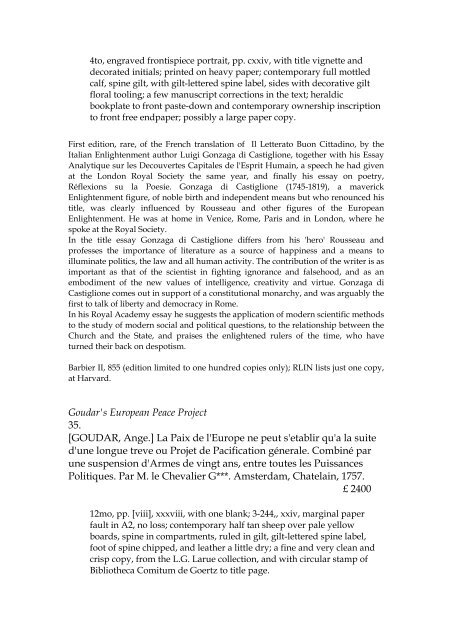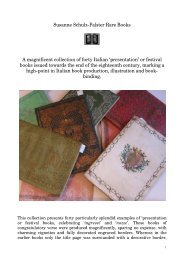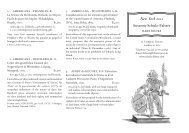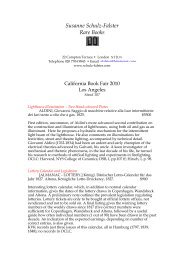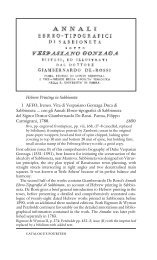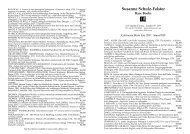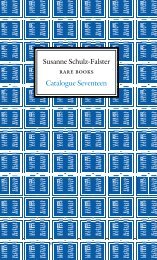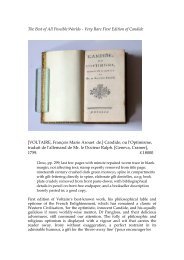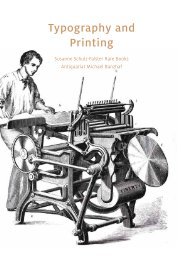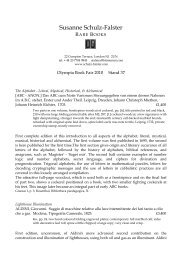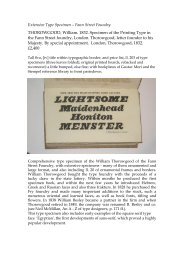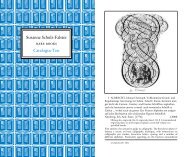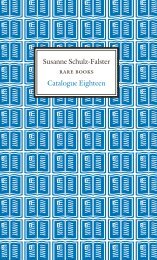«Merge Record #»«Title» - Schulz-Falster Rare Books
«Merge Record #»«Title» - Schulz-Falster Rare Books
«Merge Record #»«Title» - Schulz-Falster Rare Books
Create successful ePaper yourself
Turn your PDF publications into a flip-book with our unique Google optimized e-Paper software.
4to, engraved frontispiece portrait, pp. cxxiv, with title vignette and<br />
decorated initials; printed on heavy paper; contemporary full mottled<br />
calf, spine gilt, with gilt-lettered spine label, sides with decorative gilt<br />
floral tooling; a few manuscript corrections in the text; heraldic<br />
bookplate to front paste-down and contemporary ownership inscription<br />
to front free endpaper; possibly a large paper copy.<br />
First edition, rare, of the French translation of Il Letterato Buon Cittadino, by the<br />
Italian Enlightenment author Luigi Gonzaga di Castiglione, together with his Essay<br />
Analytique sur les Decouvertes Capitales de l'Esprit Humain, a speech he had given<br />
at the London Royal Society the same year, and finally his essay on poetry,<br />
Réflexions su la Poesie. Gonzaga di Castiglione (1745-1819), a maverick<br />
Enlightenment figure, of noble birth and independent means but who renounced his<br />
title, was clearly influenced by Rousseau and other figures of the European<br />
Enlightenment. He was at home in Venice, Rome, Paris and in London, where he<br />
spoke at the Royal Society.<br />
In the title essay Gonzaga di Castiglione differs from his 'hero' Rousseau and<br />
professes the importance of literature as a source of happiness and a means to<br />
illuminate politics, the law and all human activity. The contribution of the writer is as<br />
important as that of the scientist in fighting ignorance and falsehood, and as an<br />
embodiment of the new values of intelligence, creativity and virtue. Gonzaga di<br />
Castiglione comes out in support of a constitutional monarchy, and was arguably the<br />
first to talk of liberty and democracy in Rome.<br />
In his Royal Academy essay he suggests the application of modern scientific methods<br />
to the study of modern social and political questions, to the relationship between the<br />
Church and the State, and praises the enlightened rulers of the time, who have<br />
turned their back on despotism.<br />
Barbier II, 855 (edition limited to one hundred copies only); RLIN lists just one copy,<br />
at Harvard.<br />
Goudar's European Peace Project<br />
35.<br />
[GOUDAR, Ange.] La Paix de l'Europe ne peut s'etablir qu'a la suite<br />
d'une longue treve ou Projet de Pacification génerale. Combiné par<br />
une suspension d'Armes de vingt ans, entre toutes les Puissances<br />
Politiques. Par M. le Chevalier G***. Amsterdam, Chatelain, 1757.<br />
£ 2400<br />
12mo, pp. [viii], xxxviii, with one blank; 3-244,, xxiv, marginal paper<br />
fault in A2, no loss; contemporary half tan sheep over pale yellow<br />
boards, spine in compartments, ruled in gilt, gilt-lettered spine label,<br />
foot of spine chipped, and leather a little dry; a fine and very clean and<br />
crisp copy, from the L.G. Larue collection, and with circular stamp of<br />
Bibliotheca Comitum de Goertz to title page.


